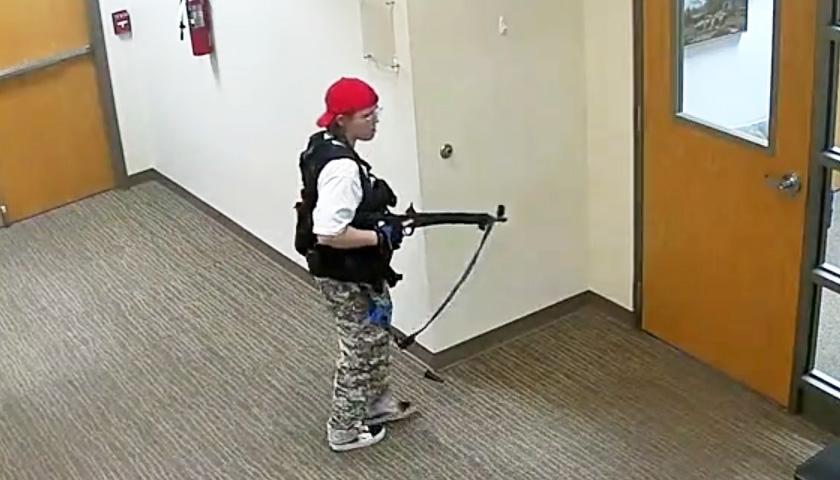Live from Music Row on The Tennessee Star Report with Michael Patrick Leahy – broadcast live Tuesday morning on Nashville’s Talk Radio 98.3 and 1510 WLAC weekdays from 5:00 a.m. to 8:00 a.m. – host Michael Patrick Leahy welcomed Dr. John R. Lott, Jr. founder and president of the Crime Prevention and Research Center (CPRC) to the newsmakers line. Lott is also an economist and a world-recognized expert on guns and crime and a former professor at Yale, Stanford and the University of Chicago.
During the third hour, Dr. Lott described how he saw the coronavirus increasing in states northern states like New York. He went on to explain how the spread could correlate to colder weather in the Northern Hemisphere and lesser instances in warmer states and countries.
Leahy: We are joined now by our friend John Lott. And John has a very interesting op-ed at Townhall.com the other day. He co-wrote it with Professor Timothy Craig Allen about the coronavirus and where it’s likely to spread. He’s the President of the Crime Prevention Research Center. Dr. Lott thank you so much for joining us this morning.
Lott: Good morning.
Leahy: Your question at the Townhall will the coronavirus recede as spring arrives? Tell us a little bit about the argument you make there?
Lott: Most coronaviruses are seasonal. When you start getting into warmer weather in April and May, in particular, you are going to start to see the virus disappear. It doesn’t completely disappear but the rates of infection go down fairly dramatically at that time.
And the question is well do you have to wait until that time of year in order to find out whether it’s going to be seasonal? Because we are not sure. I’m not sure whether this will be or not.
But the thing is even though it hasn’t warmed up a lot yet obviously in the Northern Hemisphere parts in the Northern Hemisphere it has been warm in other parts of the world. There’s the Southern Hemisphere.
So the question is can you look to places where it already is warm to see what the rate of infection will be and the death rate. But when it ends up getting warmer in the Northern Hemisphere.
So what we did was is we looked at all the countries of the world and to see whether or not the account for other factors that explains the death rate there whether it was affected by the latitude that you saw.
And what we found is that the further south that one went the fewer deaths. Now there are two ways to look at this. You can look at either the infection rate or the death per capita rate. But the issue with the infection is that obviously there has been a lot of differences in terms of rates in different countries who have been testing for this coronavirus.
In order to try to get a more accurate measure is the death rate. The population. People identify simply by the lung damage afterward. And what we’ve found is that seven months prior to the world have had very low death rates even when you add in a lot of other factors.
As you go north it goes up until you get to about 45 degrees latitude which is about the areas of the northern US around the New York area. You can see some general evidence that this is correlated with the temperature.
Leahy: And your co-author on this is Professor Timothy Allen. He knows a lot about this. At the University of Mississippi. Pulmonary pathology. So he studies this kind of data. You usually study crime stats but statistics are statistics, right?
Lott: Right. Well, Tim’s study of how people get infectious diseases. And so he’s kind of an expert in knowing other types of factors and that we get.
Leahy: Have you worked with Professor Allen on other projects before? Or did this just come up because you had an interest in the coronavirus as a pandemic and connected with him? Is this the first time you’ve worked together?
Lott: Well, Tim is on our Board of Directors at the Crime Research and Prevention Center, so I’ve known Tim for a while. He now has a medical degree, but he has a law degree from the University of Chicago Law School.
Leahy: I have a question about data and reliability of data. And since you study it all the time you could be very helpful to me and to our listening audience. I don’t believe the data coming out of China. The data showing oh, there are no new cases virtually no new deaths. Give us some insight as to the reliability of data from China on the coronavirus pandemic.
Lott: Look I mean its surely possible that different countries are going to be lying about this. Less than other countries right now simply because there may have been real problems with their data early on.
You have doctors from other countries now that are in China and that are involved in this situation and you would think that there would be stories that would be coming out of the country if in fact there were a lot more infections. Is it possible that they could be lying about it?
Yes. But its pretty much a very short run benefit for them to do that. In fact, their crackdown had not succeeded for them to go and say, “Ok we’re going to open up the factories again and engage in an infection that spread where to go an pick up again. It would have been a lot of pain for very little gain at that point.”
Leahy: So you’ve been the president of the Crime and Prevention Research Center for how long? 10, 15, 20 years? Tell us a little bit about what that group does.
Lott: We’ve always been around for
Leahy: It seems so much longer than you’ve been out there.
Lott: I’ve been a professor for most of my life. I’ve had positions at Yale, Stanford, and the University of Chicago and the Wharton Business School. I’ve had my under research that’s gotten attention, and so I’ve been out there talking about things.
Typically, gun control type issues and crime type issues for a while. But basically six-seven years ago I was getting tired of the political correctness in academia and I just decided that we can go and set up a center where a lot of different academics can go and kind of know where the bodies are buried so to speak with regard to crime data. And we can go and work from there.
Listen to the full third hour:
– – –
Tune in weekdays from 5:00 – 8:00 a.m. to the Tennessee Star Report with Michael Patrick Leahy on Talk Radio 98.3 FM WLAC 1510. Listen online at iHeart Radio.
Photo “Dr. John Lott” by Dr. John Lott.








